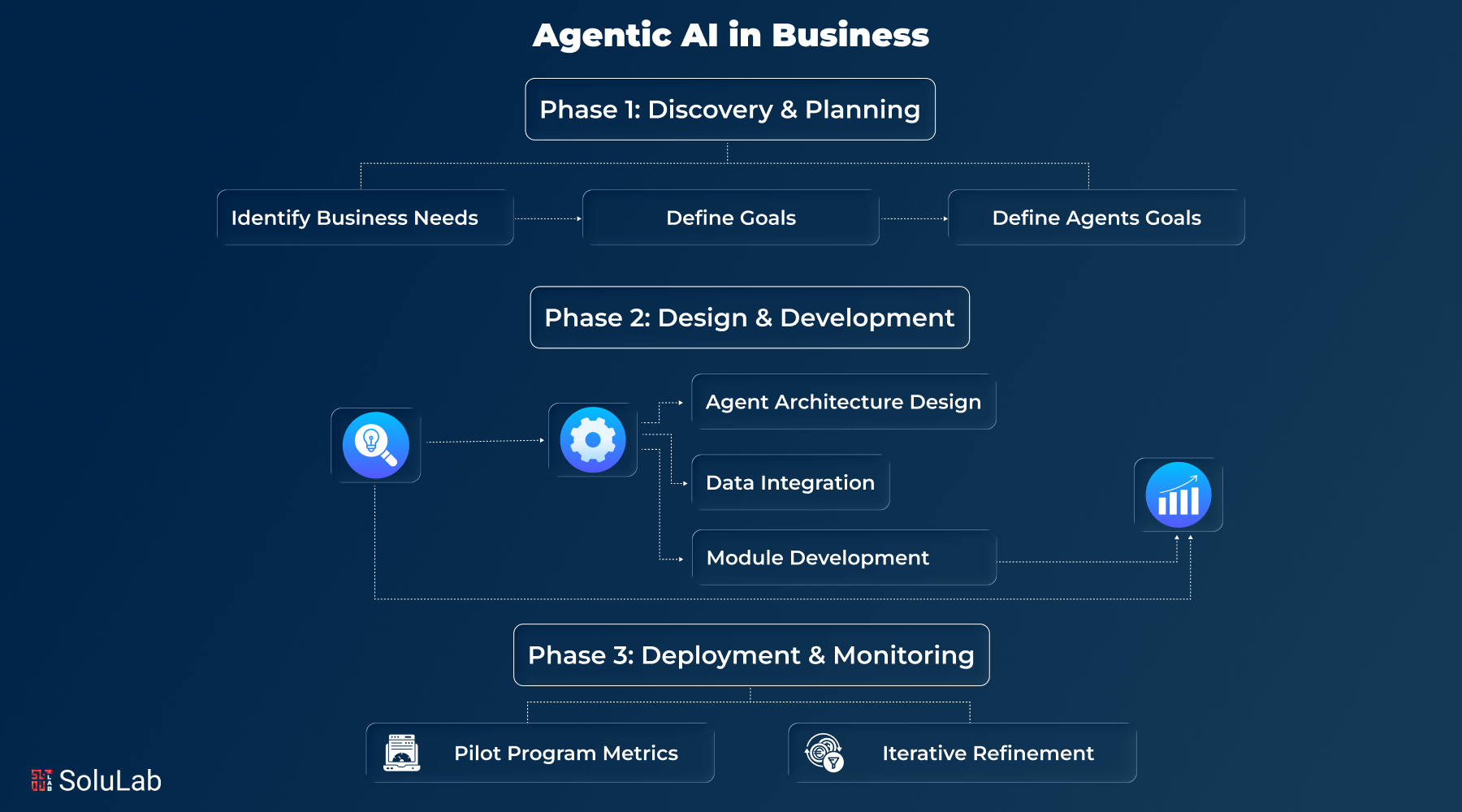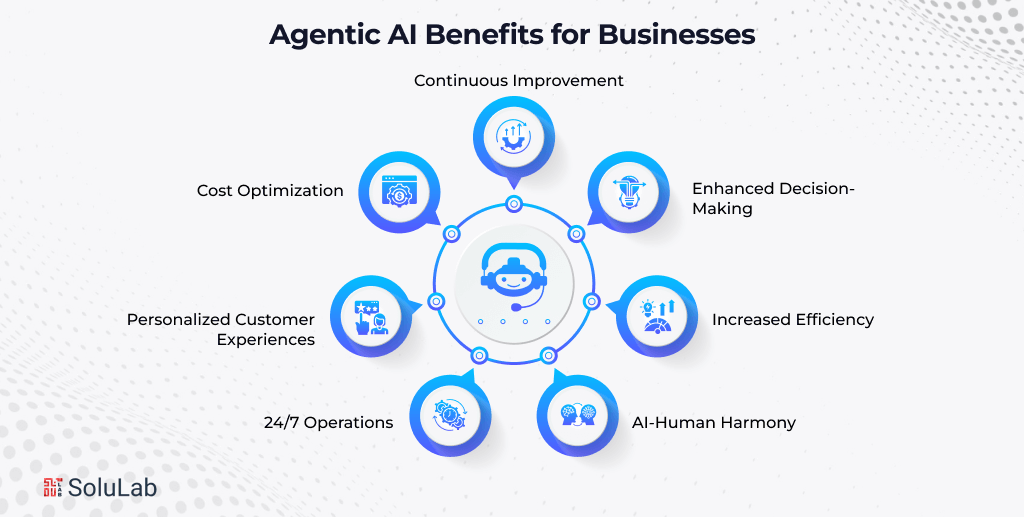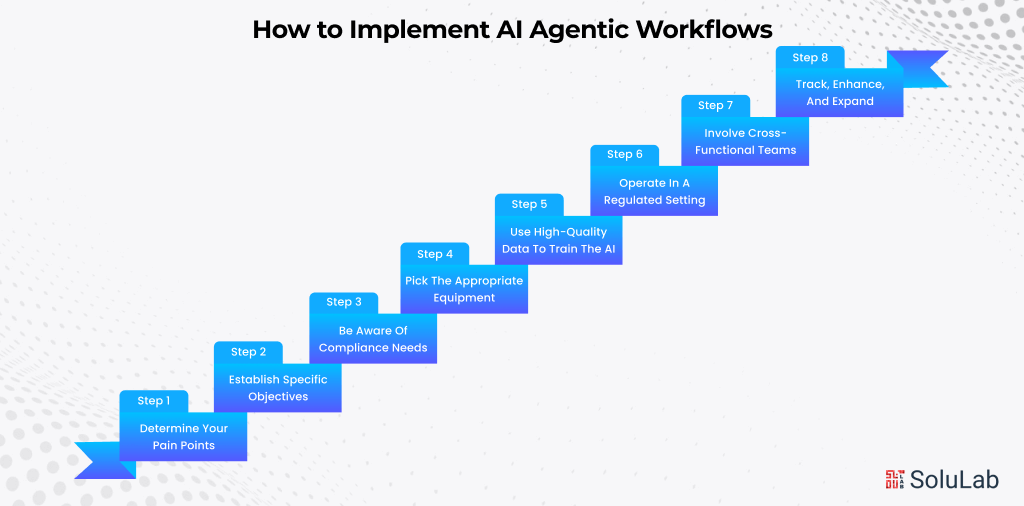
Struggling to keep up with rising customer expectations, slow decision-making, or repetitive tasks draining your team’s energy? Many businesses face these same challenges, trying to do more with less.
However, agentic AI can help you break that cycle. Unlike traditional automation, Agentic AI doesn’t just follow instructions; it thinks, decides, and acts with autonomy. Whether it’s handling customer queries, optimizing logistics, or operations, this next-gen AI tech acts like a proactive team member, not just a tool.
But implementing it can feel overwhelming. Where do you start? What’s the right use case? What infrastructure do you need? This blog will guide you step-by-step on how to implement Agentic AI in your business, from identifying the right areas to integrating without disrupting your current workflows. Let’s get started!
What is agentic AI?
| The global enterprise agentic AI market, valued at $2.59 billion in 2024, is expected to reach $3.67 billion in 2025, growing at a 46.2 % CAGR, and projected to hit $53.7 billion by 2030. |
Agentic AI refers to artificial intelligence systems that can act independently, make decisions, and pursue goals without constant human intervention. Unlike traditional AI, which typically follows specific instructions, agentic AI operates more like an autonomous agent; it observes its environment, plans actions, adapts to changes, and learns from outcomes.
These systems can break down complex tasks, set sub-goals, and even decide how to achieve them based on context. For example, an agentic AI could manage a project, schedule tasks, communicate with team members, and make adjustments. To successfully scope your rollout, ground your strategy in the core agentic qualities—autonomy, goal-oriented reasoning, multi-step planning, cross-system orchestration, and enterprise context/memory—which explain why agentic AI drives measurable improvements in everyday work like ticket resolution, onboarding, and approvals.
Benefits Of Agentic AI for Your Business
Agentic AI in business is changing how businesses operate—offering smarter decision-making, better customer interactions, and automation that understands context and intent, not just instructions.

-
Smarter Decision-Making
Agentic AI goes beyond data analysis. It evaluates options, sets goals, and acts autonomously, helping B2B companies make informed decisions faster, whether it’s pricing strategy, lead qualification, or inventory optimization.
-
Personalized Customer Support
Instead of basic chatbots, Agentic AI offers intelligent, conversational experiences. It remembers past interactions, understands intent, and resolves issues proactively, making your support team more scalable and effective.
-
Streamlined Operations
Agentic AI can manage repetitive tasks like email follow-ups, report generation, and task assignments. This frees up your team to focus on high-value work and accelerates project timelines without micromanagement.
-
Marketing Execution
It can create, test, and optimize marketing campaigns in real-time. From writing emails to adjusting ad spend, Agentic AI ensures your messaging adapts to customer behavior and market trends automatically.
-
Scalable Sales Enablement
Agentic AI helps sales teams by handling lead research, writing personalized pitches, and scheduling follow-ups. It works like a 24/7 assistant, boosting productivity and ensuring no opportunity slips through the cracks.
How to Implement Agentic AI in Your Business?
Follow this step-by-step guide to implement agentic AI in your business:
1. Determine Your Pain Points
Start by identifying your company’s challenges, repeated work, or slow decision-making procedures. Selecting the appropriate domains, such as lead qualifying or customer care, guarantees that your AI agent in business provides genuine value by automating the most important tasks.
2. Establish Specific Objectives
Specify your goals for deploying agentic AI, such as improved data analysis, quicker customer response, or more efficient operations. When implementing any AI-driven strategy, having well-defined objectives aids in impact measurement and ROI justification.
3. Be Aware of Compliance Needs
Compliance is a must in B2B. Ensure that your application of agentic AI complies with industry norms such as GDPR, ISO, or RBI regulations. This approach reduces legal risks, safeguards your data, and builds confidence.
4. Pick the Appropriate Equipment
Select AI tools or platforms designed for self-governance and judgment. Pay attention to aspects like data integration, automation triggers, and multi-step reasoning. With the correct tools, your business AI agent may perform intelligently without continual oversight.
5. Use High-Quality Data to Train the AI
It’s critical to feed your agentic AI with precise, high-quality data. To train your model, use CRM data, operational reports, and previous customer encounters. This guarantees that your AI system operates dependably in practical situations.
6. Operate in a Regulated Setting
Test your AI solution on a modest scale before investing heavily. To find mistakes, modify workflows, and assess the impact without affecting your entire business, run pilot programs in a single department or process.
7. Involve Cross-Functional Teams
IT isn’t the only task involved in implementation. incorporate legal, operations, marketing, and sales into the rollout. Their suggestions aid in improving the way the AI agent in business communicates with teams and other systems.
8. Track, Enhance, and Expand
After going live, keep an eye on the KPIs of reaction time, error reduction, and efficiency gains. For optimal business impact, use this data to optimize performance and progressively scale Agentic AI development across departments.

Use Cases of Agentic AI Across Industries
Agentic AI is changing business operations, automation, and scalability across sectors by providing better processes, individualized experiences, and quicker decision-making with less human involvement.
1. Automation of Customer Support
B2B enterprises are using agentic AI to build intelligent chatbots that respond to customer inquiries. These AI agents lessen the workload for humans, comprehend context, and solve problems fast. Better client satisfaction and quicker turnaround times are the outcomes of this. AI agents are assisting companies in providing reliable, round-the-clock assistance in business applications such as customer service.
2. Optimization of the Supply Chain
Without requiring human participation, agentic AI may anticipate disturbances, proactively monitor supply chains, and take corrective action. Businesses can lower expenses, improve inventory control, and minimize delays. Smarter, quicker, and more =supply chain operations are guaranteed when agentic AI is included in commercial logistics.
3. Management of Sales and Leads
AI agents that score leads, send tailored follow-ups, and suggest outreach tactics can help sales teams. This shortens sales cycles and boosts conversion rates. Applications of agentic AI in business sales assist B2B companies in reducing time spent on cold leads and prioritizing high-value prospects.
4. Compliance and Financial Reporting
Agentic AI enables B2B financial teams to monitor compliance risks, automate report preparation, and instantly identify anomalies. This guarantees current financial health monitoring and lowers errors. In corporate applications, these AI agents are particularly useful in sectors with stringent regulations.
5. R&D and Product Development
Agentic AI examines consumer feedback, market trends, and competition data in industries like technology and pharmaceuticals to recommend new or improved products. This keeps B2B businesses ahead of the curve and accelerates innovation. Smarter, data-driven product strategies are fostered by incorporating agentic AI into company R&D.
Conclusion
Implementing Agentic AI in your business isn’t just about adopting new tech. It’s about building smarter, more automated systems that drive real value. From automating repetitive tasks to making data-driven decisions, agentic AI applications in business can reshape how teams work and scale.
Start small, experiment with use cases, and focus on integrating agentic AI in business processes that truly need enhancement. The key is to align your AI strategy with business goals and ensure your teams are ready to adapt. With the right approach, AI agents in business applications can become your most efficient digital partners.
SoluLab, an AI agent development company, helps you automate your business by building and integrating AI agents that reduce manual, repetitive tasks and improve efficiency. Contact us today to discuss further!
FAQs
1. How does Agentic AI work?
Machine learning, goal-setting logic, and feedback loops are all used by agentic AI to carry out tasks automatically and get better over time through continuous learning.
2. What is an example of an Agentic AI?
A basic example of an agentic AI is an AI assistant that uses your calendar and preferences to plan scheduling, make travel arrangements, and respond to emails.
3. Do I need a tech team to implement Agentic AI?
Not always. Non-technical teams may efficiently use and maintain AI agents in commercial applications with the help of numerous low-code and no-code platforms.
4. What industries benefit the most from Agentic AI?
The use of agentic AI applications in business processes is yielding significant benefits for sectors such as manufacturing, retail, healthcare, and finance.
5. How do I measure the success of Agentic AI in my business?
To assess the effectiveness of AI agents in business applications, monitor indicators such as decreased manual hours, improved task accuracy, customer happiness, and return on investment.





